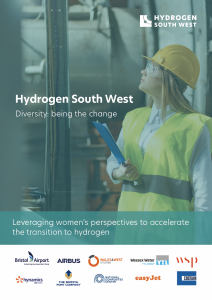The West of England’s burgeoning hydrogen sector needs to embrace gender diversity more if it is to continue to grow while helping in the fight against climate change.
By doing this it will also encourage more innovation and challenge established thinking as it assists in accelerating the transition to net zero. 
The recommendation emerges from a report by regional industry partnership Hydrogen South West that recognises the only way the sector will flourish is by embracing a range of diverse voices that reflect the population at large.
It says with the UK hydrogen sector expected to need 90,000 skilled workers by 2030, there was an unprecedented opportunity to create a future legacy of skilled and creative roles and sustainable employment in the region.
The report explores the breadth and depth of roles that will be required, how their multidisciplinary nature is appealing to a wide range of people and the correlation between diversity and overcoming challenges.
Formed in 2022, Hydrogen South West is investigating ways to decarbonise transport, commerce and power in the region while driving sustainable growth, upskilling the workforce and delivering job opportunities.
It focuses on key sectors such as shipping, aviation and housing as well as industry, and is made up of leading companies active in the region, ranging from aerospace giants Airbus and GKN, both with major plants at Filton, to Bristol Port, Bristol Airport and Wales & West Utilities.
Other members include Hynamics, a specialist subsidiary of French energy group EDF, engineering and construction firms Costain and WSP, and airline easyJet, the largest operator out of Bristol Airport. 
Hydrogen South West chair Andy Clarke, pictured, who is also director for integrated transport at Costain, said: “We need our best team on the pitch and right now, the data indicates that women are under-represented in the hydrogen sector.
“At Hydrogen South West, we recognise the positive impact which strong representation from diverse groups has on decision-making, eliminating group think and unlocking innovation.
“As an emerging sector, it is within our power to embed equity, diversity and inclusion into the DNA of our activities, and that is what we intend to do.”
Bath MP Wera Hobhouse, pictured, said, as a champion of both women’s rights and the environment, she could see that the hydrogen sector represented a natural convergence of the two. 
“Hydrogen is very important for both the transition to net zero and the growth of our regional economy, and a diverse workforce will be central to its success,” she added.
“It’s important that we tap into women’s potential by inspiring them to embark upon technical professions, seek careers in hydrogen and bring their unique perspectives to problem solving, for the good of society as a whole.”
The Women in Hydrogen report was officially launched at Bristol’s pioneering National Composites Centre, which opened on the Bristol & Bath Science Park at Emersons Green in 2011 with industrial and aerospace giants Airbus, GKN Aerospace, Rolls-Royce, AgustaWestland (now Leonardo’s helicopter division), and Vestas as its founding members.
Last year it became home to the University of Bristol’s groundbreaking £225m Isambard-AI phase one supercomputer – the fastest and most powerful in the UK.
National Composites Centre chief business officer Jo Dally said it was widely recognised that a diverse and inclusive workplace fostered innovation and collaboration.
“This paper is a call to arms to government, academia and industry to act consciously to create this environment, for the benefit of our future hydrogen economy. In doing so, we shape a more successful environment for everyone,” she added.






























